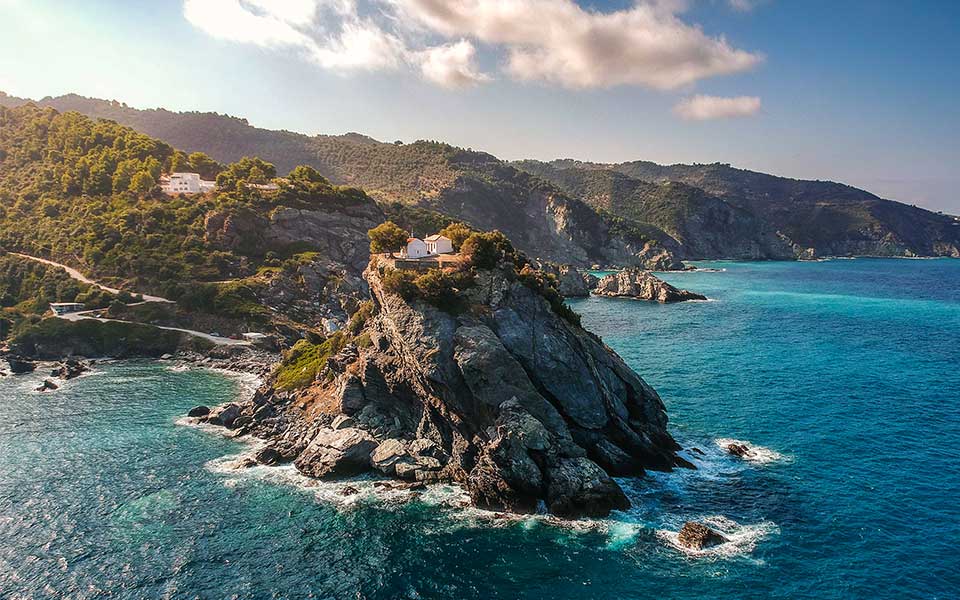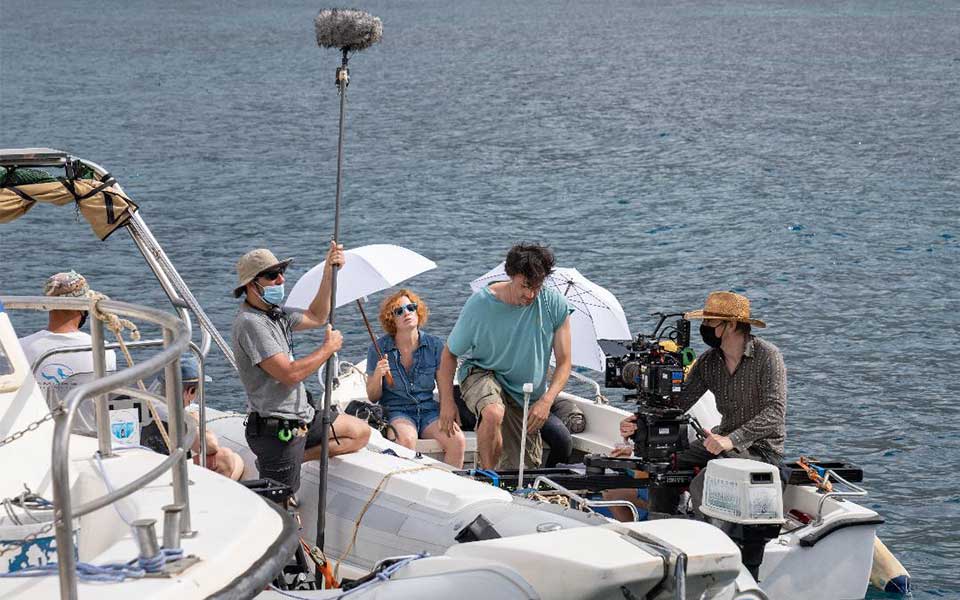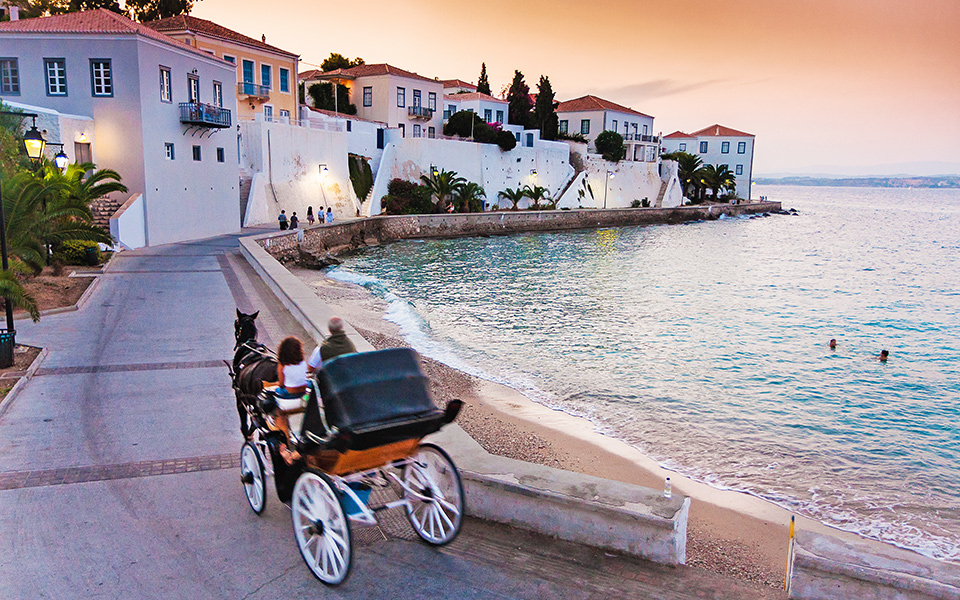By Korina Samarkou
Leda is a middle-aged divorced university professor who has dedicated her life to her daughters and her job in her native Italy. When the girls move to Canada to live with their father, she decides to spend her summer at a seaside village on the southern Italian coast.
There, a random encounter with a gregarious Neapolitan family will reopen painful wounds from her past.
Actress Maggie Gyllenhaal knew that she wanted to adapt the novel “The Lost Daughter” for the silver screen from the moment she read Elena Ferrante’s book. In April of 2020, everything seemed ready for her directing debut. The Italian village where the story takes place was being recreated on the New Jersey shore, and filming was set to begin. But then COVID-19 pandemic swept through the United States, and the plans were upended.
A short while later, Gyllenhaal and her cast, which included Olivia Colman and Dakota Johnson, found themselves on the island of Spetses.
“Within a month and a half, the production changed course entirely,” explains Kostas Kefalas, head of production at the film company Faliro House, speaking to moneyreview.gr. Faliro House is the same production company that took over Syntagma Square for two days in 2019 for the filming of the American thriller “Born To Be Murdered.”
These two Hollywood movies are only part of a long list of foreign movie and television productions that have been filmed in Greece since the inauguration of the cash rebate program for the movie industry. This initiative, managed by the National Center of Audiovisual Media and Communication (EKOME), offers subsidies in the form of cash rebates based on the cost of investment for all productions that come to Greece.
As of July 2020, the percentage of the rebate was increased from 35% to 40%. In addition to the rebate, there’s also a 30% tax relief measure offered to investors in productions that are filmed in Greece.

© Shutterstock
These incentives have helped put Greece on the map for the international film industry and on the radar for Hollywood producers. According to data given to moneyreview.gr by EKOME, the program has received 136 applications to date for audiovisual productions in Greece. Out of the 99 projects involved in the program as of November 6, 2020, there were 54 domestic productions and 45 international ones, including projects from the United States, Korea, Israel, Great Britain, France, Italy, Germany, Spain, the Netherlands, Belgium, Finland, Turkey, China, Albania, Cyprus, Serbia, Romania, Hungary and Sweden.
In the past, it often seemed that Greece was doing everything in its power to discourage foreign movie productions. As a result, it not only lost out on valuable investment revenue but also missed a number of opportunities to be the “star” in big Hollywood productions and to promote the country internationally in this way.
For instance, in the summer of 2017, the producers of “Mamma Mia” chose to shoot that movie’s sequel in Croatia, rather than on the islands of Skopelos and Skiathos, where they had made the first film. In the 2016 movie “Jason Bourne”; the scene in which Matt Damon appears to be moving through a crowd of Molotov cocktail-wielding anti-austerity protestors in Syntagma Square wasn’t filmed in Athens; it was shot in Tenerife. Years earlier, director Oliver Stone failed to reach an agreement with the Greek government, so his 2004 movie “Alexander” was filmed in Morocco and not Pella, which had been Stone’s first choice.
But now, things have changed, and the 99 new projects have brought the country a total revenue of approximately €96 million, according to EKOME. As a result of these productions, which took place everywhere from the mountains of Zagori to the islands of Kythira, Mykonos and Nisyros, approximately 23,300 jobs were created for actors, technicians, auxiliary production crews, and others.
Today, Greece is seen by location scouts and others as a leading choice for filming. In 2018, thanks to the British television series “The Durrells,” a show produced by ITV that chronicles the years that the British author Gerald Durrell’s family spent on Corfu, that island was recognized as the best filming destination in Europe by the European Film Commission Network.
This was a remarkable reversal; in the toughest days of the debt crisis, when the idea of “Grexit” was a real danger, the ITV production was nearly transferred to another Mediterranean location (Croatia and Malta were both considered).

The industry “is on fire”
Today, even as the country combats another crisis – the COVID-19 pandemic – interest in Greece from foreign productions isn’t diminishing, it’s increasing.
The industry “is on fire”, says Kefalas, who predicts 2021 will be a very active yet demanding year. The increase of the rebate percentage from 35% to 40% and the government’s good management of the pandemic crisis have created even more interest in the country from production companies everywhere. In fact, Faliro House Productions is already working on two projects for the upcoming months.
The good reputation that Greece is starting to acquire is also helping, as everyone who worked on “The Lost Daughter” left Spetses with the best impressions. As Kefalas put it: “They didn’t want to leave.”
Right from the outset, the comprehensive measures taken to protect the people involved in the production inspired confidence during these difficult times, while the people of Spetses welcomed them like family, despite the challenging conditions. For local business owners, the filming gave them the opportunity to make up ground after an astoundingly bad tourist season last summer; the fact that they, in turn, did not succumb to the temptation of profiteering made a good impression on their visitors.
At about the same time that “The Lost Daughter” was wrapping up, shooting on “Triangle of Sadness,” directed by the Swedish director and Palme d’Or winner Ruben Östlund, was also coming to an end. A story of a pair of models being shipwrecked on a desert island with a group of billionaire jetsetters and a cleaning lady, the movie was filmed on the island of Evia and onboard the “Christina O”, Aristotle Onassis’ legendary yacht, in the Ionian Sea.
On Amorgos, immediately following the first lockdown, the movie “Daughters” was shot, while the Spanish drama “Mediterraneo” was filmed on locations in Attica. And for seven weeks the film “Man of God” with Mickey Rourke was filmed in locations in Athens, Lavrio and on the island of Aegina .
This article was first published in Greek at Moneyreview.gr












